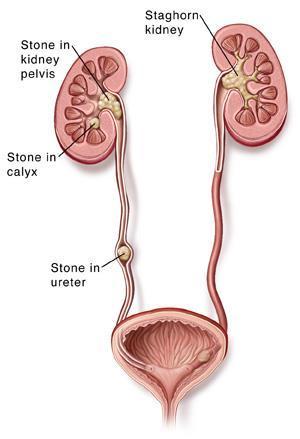Kidney stones, also known as renal calculi, are hard deposits of minerals and salts that form inside the kidneys. They can vary in size and may cause significant discomfort or pain as they move through the urinary tract. The treatment approach for kidney stones depends on their size, type, and the symptoms they cause. Here’s a comprehensive overview of typical treatments for kidney stones:
1. Self-Care and Lifestyle Changes
- Hydration: Drinking plenty of water is one of the simplest and most effective ways to help pass small kidney stones. Staying well-hydrated can help flush out the stones and prevent new ones from forming.
- Pain Management: Over-the-counter pain relievers like ibuprofen or acetaminophen can help alleviate the pain associated with passing a kidney stone.
2. Medications
- Pain Relievers: Prescription medications may be needed for severe pain, often in the form of narcotics.
- Alpha Blockers: Medications such as tamsulosin can relax the muscles in the ureter, making it easier for stones to pass through.
- Diuretics: For certain types of stones, diuretics can help reduce the concentration of minerals in the urine.
3. Medical Procedures
- Extracorporeal Shock Wave Lithotripsy (ESWL): This non-invasive procedure uses shock waves to break kidney stones into smaller pieces that can be more easily passed through the urinary tract. It’s typically used for stones that are too large to pass on their own.
- Ureteroscopy: A thin, flexible tube (ureteroscope) is inserted through the urethra and bladder into the ureter to locate and remove the stone or break it into smaller pieces.
- Percutaneous Nephrolithotomy (PCNL): For larger stones or those that do not respond to other treatments, a small incision is made in the back, and a tube is inserted to remove the stone or break it up. This procedure is usually performed under general anesthesia.
4. Surgery
- Open Surgery: This is rarely used today but may be necessary for very large stones or when other methods fail. It involves a larger incision to directly remove the stone from the kidney.
5. Preventive Measures
- Dietary Adjustments: Depending on the type of kidney stones, dietary changes may help prevent future stones. For example, reducing salt intake, limiting foods high in oxalates (like spinach and nuts), and eating a balanced diet can be beneficial.
- Medications for Prevention: In some cases, medications may be prescribed to help prevent the recurrence of stones by altering the composition of urine.
6. Follow-Up Care
- Regular Monitoring: After initial treatment, follow-up appointments may be necessary to ensure that the stones have been effectively removed and to monitor for any new stones. This might include imaging tests like ultrasound or CT scans.
The appropriate treatment for kidney stones will vary based on individual circumstances, including the size and location of the stones, as well as the patient’s overall health and preferences. If you suspect you have kidney stones, it’s important to consult a healthcare professional for a personalized treatment plan.





Comments